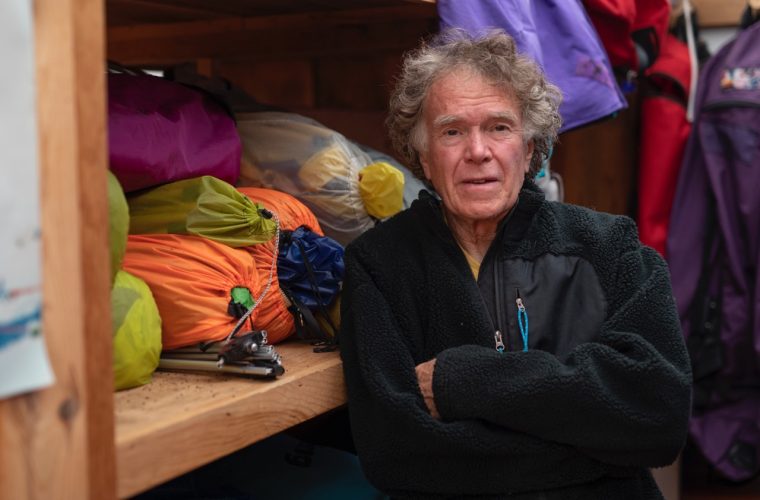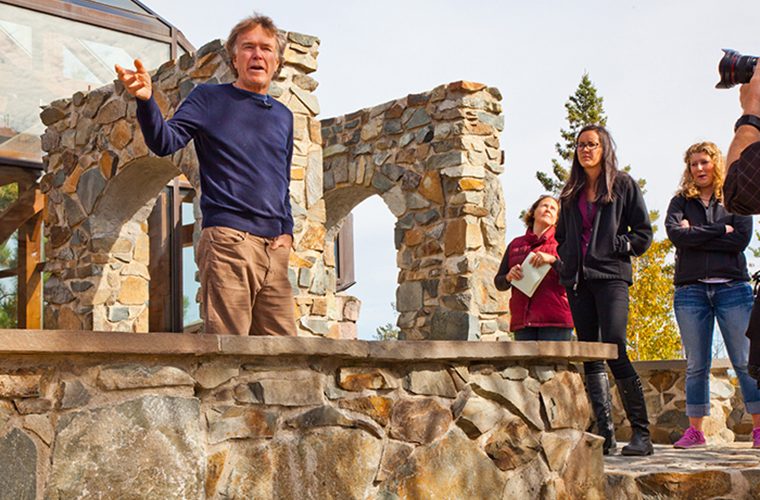Will Steger Polar Explorer, Educator, Environmental Ambassador
Will Steger is a formidable voice calling for the understanding and preservation of the Arctic and the Earth. Best known for his legendary polar explorations, Steger has traveled tens of thousands of miles by kayak, canoe, ski, and dogsled, leading teams on some of the most significant polar expeditions in history. Due to a changing climate and the subsequent loss of ice, none of Steger’s expeditions could be replicated today. Many of his expedition firsts will also go down in history as the last.

The Explorer
Will Steger stands out as the pre-eminent explorer of our time. He has a record of unprecedented firsts to his name:
-
- First confirmed dogsled journey to the North Pole without re-supply (1986)
- 1,600-mile south-north traverse of Greenland, the longest unsupported dogsled expedition in history (1988)
- First dogsled traverse of Antarctica, the historic seven-month, 3,471-mile International Trans-Antarctica Expedition (1989–90)
- First dogsled traverse of the Arctic Ocean in one season from Russia to Canada’s Ellesmere Island (1995)
Steger continues his explorations, embarking on annual solo expeditions to the Canadian Arctic to push physical limits, document a changing climate, and connect with communities around the globe.
Educator
Education is central to everything Will Steger undertakes. He received his B.S. in Geology and M.A. in Education at the University of St. Thomas, St. Paul, Minnesota, and taught science for three years at the secondary level. In 1970, he moved from his birthplace in Minneapolis to the wilderness north of Ely, Minnesota. There he founded a winter school and for ten years created outdoor programs using dog teams and skis as means of travel. But he knew he needed to move beyond the classroom to make the kind of educational impact that he wanted.
His unique ability to blend extreme exploration with cutting-edge technology has made him a pioneer in online education, allowing him to reach millions of people around the world under some of the most hostile conditions on the planet. He may use primitive methods for his travel, but his expeditions take place at the frontier of the information age. Steger’s International Trans-Antarctica Expedition had over 16 million global followers via satellite updates before the arrival of the internet. Over 2 million students followed his 1995 International Arctic Project via journal entries and live interactions. That expedition sent the first-ever transmission of a digital photograph from the North Pole.
Steger’s pioneering work in adventure-based environmental education was pivotal as he founded the Global Center of Environmental Education at Hamline University and the World School for Adventure Learning at the University of St. Thomas in 1993. Based on his unique eyewitness experience with climate change in the polar regions, Steger established the nonprofit Climate Generation in 2006 to educate and empower people to engage in climate change solutions.
Environmental Ambassador
Steger is a recognized authority on polar environmental issues and is a ceaseless advocate for the Earth’s well-being. He has testified before the United States Congress on the Arctic regions, climate change, and other environmental issues. The 1990 International Trans-Antarctica Expedition was instrumental in garnering international support for preserving Antarctica from mineral exploration, and in 1992 succeeded in securing all Antarctic Treaty nations’ signatures to maintain Antarctica’s protection for research and education. (The recent film After Antarctica documents the impact of this expedition and international accomplishment.)
Steger was invited to testify on climate change before eight joint committees of the Minnesota Legislature in January 2006; his eyewitness account resulted in the passing of bipartisan policies, including a renewable electricity standard and an economy-wide greenhouse-gas-reduction law.
Photographer and Author
Steger’s highly acclaimed articles and spectacular photographic images have been published and appreciated worldwide, including three features in National Geographic magazine. He is the author of five books: North to the Pole, Saving the Earth, Crossing Antarctica, Over the Top of the World, and The Steger Homestead Kitchen.
Accolades
Will Steger has received worldwide recognition and numerous honors for his record-setting explorations and interactive educational initiatives.
Steger joins Amelia Earhart, Robert Peary, Roald Amundsen and Jacques-Yves Cousteau in receiving the National Geographic Society’s prestigious John Oliver La Gorce Medal for “accomplishments in geographic exploration, in the sciences, and for public service to advance international understanding” in 1995. He is the only recipient to be nominated in all three areas and this award has not been given since. Steger co-founded the National Geographic Society Explorers-in-Residence program in 1996 and became the first Explorer-in-Residence. He received the Explorers Club’s Finn Ronne Memorial Award in 1997.
International Awards
Over the years, Will’s accomplishments have been recognized by numerous institutions of higher education. He has received numerous Honorary Doctorate degrees, including:
- Doctor of Letters, University of St. Thomas, Minnesota, 1991
- Doctor of Science, Westminster College, Utah, 1991
- Doctor of Science, Hamline University, Minnesota, 2010
- Doctor of Science, Franklin Pierce University, New Hampshire, 2011
- Doctor of Science, Northland College, Wisconsin, 2015
For his tireless dedication to raising awareness of and solutions to the climate crisis, Steger has received numerous awards: In 2006, he joined Jacques-Yves Cousteau, Dr. Thor Heyerdahl and Neil Armstrong in receiving the Lindbergh Award. He was given this award for “numerous polar expeditions, deep understanding of the environment and efforts to raise awareness of current environmental threats, especially climate change.” That same year Steger established and then was appointed by Governor Tim Pawlenty to serve on the Minnesota Climate Change Advisory Council, a group charged with recommending a Climate Action Plan to substantially reduce Minnesota’s greenhouse-gas emissions. In 2007, Steger received the prestigious Lowell Thomas award from the Explorers Club, which had previously been awarded to Sir Edmund Hillary, Sylvia Earle, and Yvon Chouinard. Again in 2007 Steger received the National Geographic Adventure Lifetime Achievement Award. In 2014, a Minnesota Senate Resolution honored his leadership and accomplishments in raising awareness of the urgency of climate change.

Present Life Ensuring a lasting legacy
Will Steger established the Steger Center in 2013 to preserve his legacy. Set in a pristine boreal forest wilderness ecosystem near Ely, Minnesota, it is a place for innovation, leadership and sustainability.
Will Steger continues to inspire and motivate generations of people to care for the earth and live their lives with a sense of exploration, curiosity, and adventure.
